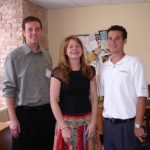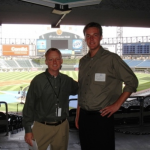Oren Madison, a child psychologist working in Chicago, IL, is becoming more accustomed to working with adults, but only after realizing that be helping kids, he’s helping their parents too. Currently working at a Chicago area children’s hospital, Oren hopes someday to work in a school setting, where he can establish himself, and hopefully develop a program that will extend beyond the reach of one man. He was inspired to this vocation after extended internships in local high schools, in Denver, during his matriculation as an undergrad there.
Oren realized, at an early the age, the power of therapy, when his own parents got divorced. After seeing first hand the power of empathy in the therapist’s office, Oren’s future began trending the way of helping children confront their social and emotional issues.
“Everyone,” Oren says, “has something going on. Empathy is simply listening [to what’s going on] without judgment.” Oren says that “trust is the key to everything,” and that without trust, there is no meaningful progress to be made. Adults, Oren says, often cannot listen in the non-judgmental way that children need to really trust someone. Oren’s advice to all who care is to “Study harder. Pay attention to what you’re learning and really learn it. Don’t fit right in the middle academically, but rather, stand out.”
INTERVIEW
Oren is 28. He lives in Chicago. He drives a Subaru Outback. He gave us a ride from our interview back home to Wabash.
He has a tattoo of an infinity sign on the back of his right shoulder.
“It’s a sign that there is always going to be work out there to be done with kids. There’s always going to be someone out there that needs to be listened to. It’s a daily reminder to never forget why I do this. I always knew I wanted to do this. So if I’m 50 years old and look back, and forget the road I was on or supposed to be on.”
Oren is a child therapist.
What I want to do is work in a school setting. Middle school or high school. There’s tons of different types of schools, like Chicago Catholic. Just wherever it takes me.
What are you trying to do? You’re trying to be the guru of Chicago child therapy? What’s the deal?
I guess I kind of started with a passion for wanting to work with kids. From there, with undergrad, I did some understudy programs working with high schools in Denver. When I moved back here I went to grad school. I really want to create some kind of program that’s not specific to my work, but just trains people to infiltrate it throughout Chicago and see wherever it goes.
Where’s the passion for children therapy come from? Does it come from when you were a kid?
My parents got divorced when I was 13. They forced me to go to a therapist. For about a month I was totally against it. Then I was like, ‘Wait a minute. This person is totally objective and they’re just listening.’ I didn’t realize you could actually do that for a living. That’s where it all started.
The seed was planted at 13 years old when you were sitting on the couch.
Just talking. Yeah.
So you’re trying to get in the school setting. There’s actually opportunities for you to get involved in the school?
Definitely. All schools have a school counselor. That person’s role can be anywhere from academic counseling to dealing with a divorce or fight within the family or with a boyfriend or girlfriend. They talk to you and then go from there.
So there is a difference between a career counselor who helps you get a job or go into college, and the person who deals with the social, emotional side.
Definitely.
So you’re currently working at a hospital right now?
Yeah. Children’s Memorial.
How long how you been working there?
I’ve worked there for three years. Before that I worked in Colorado at a residential setting. Kids who basically need really long term treatment. They’ve been kicked out of foster care. They almost went to jail because they did something. So they come to us.
So what have you learned in those three years of talking with these kids who come in?
I realized everyone has something going on. Kids make bad decisions. Some of it comes from who we are and what we do. Some of it comes from families and how we’re raised. So what I really want to do is empower the kids to make decisions. And also teach families on how to support their kids through that process.
So what it is the process itself when you have a kid come to your office and present a problem to you?
First of all, most kids aren’t hurt. Most of the time kids are talked at. I guess the first and foremost is being an open ear to kids. Let them be heard and relax in the situation with the attitude that anything can be handled. From there, just help them problem solve. Help them realize that their choices have consequences both positive and negative. Hopefully I’m guiding them down a road that’s going to be more successful for them.
So do most of these problems these children have stem from confidence problems? Fit into society? Is there a common theme that you can put on it?
Because I work in such a high qued area in a hospital, kids are there for homicidal issues. They try to bit their mom or stab a teacher. Or they try to commit suicide. The issues I’m dealing with right now in the hospital are way more intense. But hopefully in the school settings it will be more confidence or self esteem issues.
How do you do that?
How do you help someone with self esteem?
Well, it’s just such a job that takes a lot of courage to do every day. Not everyone can do that like the sight of blood. How do you detach yourself from the problems? Or do you detach yourself?
I think there’s definitely a piece that relates to boundaries. If you personalize everything, then you’re going to start crying with every single person you meet with. The stories you hear about the abuse and the neglect that go on are horrible. I guess what I’m able to do after working in the setting so long is just not be shocked by anything. Just have an attitude that anything can be fixed.
What works for one kid is not going to work for another kid. Just being able to listen to the specifics of a situation and help them figure out what’s going to be the best for them.
What’s the worst story you’ve heard?
Worst story I’ve heard. Well, any type of sexual abuse for a kid is horrible. Whether it’s a baby sitter or a family member. The types of trama that comes from that are life long. You don’t necessarily know what’s appropriate anymore. You’ve been violated as a kid. You could act out aggressively. You can have angry feelings to all adults or anybody. You can be constantly irritable. It’s a really sad situation.
Definitely. So you just can’t get involved in that stuff. You just have to persevere?
In those situations, it’s really kind of about helping them work through it. It’s a really long process. Just help them to try to be in a situation where they have people they can start to trust. Hopefully that starts as a therapist. Hopefully that starts with you.
How important is passion and having that enthusiasm to go to work every day. Because I’m sure there are those days for you when you don’t know if you could do it. You probably have your own problems.
Oh yeah. We all have our own problems. Exactly. And that’s something that we definitely talk about in the field. The more you ignore your own stuff, the more it’s going to come out with your patients. Definitely having that support system with the people you work with or the family, whomever, just get it out so that when you go to work the next day you’re fresh and can listen with a clear head.
So you’re different in the sense that a lot of people we talked to are already at their destination. But you’re in pursuit of it.
Pursuit of it. Exactly. My end, what I really want, is to create a plan where there’s programs in place in schools and the community where kids can begin to learn about how to make good choices. And what those consequences are.
If we all think back to when we were in high school, it’s like, sure, you go out and do this and nothing bad happens. So you think automatically that you can do that whenever you want. Whether it’s drinking or drugs or any other types of risky behavior. From there, you begin to develop patterns. Then, when one bad thing happens you think it’s a fluke. Or it happens to someone in your school and you think it’s not going to happen to me.
Hopefully what I can do is develop programs where kids can see in advance what can happen with certain behaviors.
And then also teach parents how to educate well in the home. Because a kid is going to listen to their parents more than they are to a teacher or a counselor. Especially if they’re doing it in a way that they’re not telling them what to do, but teaching them on what to do.
It’s like any kind of mentor that we’ve ever had. You look up to them and you want to exemplify them. Not because they’re telling you not to do something, but because you look up to them as a role model. Hopefully I can surround myself with a few people that developed these programs that will make a difference.
So what’s the biggest obstacle you’ve faced in trying to realize your dream?
I think right now it’s just getting in there. These things aren’t in place right now. Thinking about who I’m going to surround myself with in order to be able to make this happen is my biggest fear for not succeeding.
I was going to ask you about that. Do you have any second thoughts about your career choice?
No. I couldn’t do anything else. I have friends and family in real estate and law and medicine and investment banking and all this stuff. I couldn’t imagine doing that for a day. I think being around kids and making a difference with them is the only thing I see myself doing.
Do you get energy as you go throughout the day?
Definitely. I go home from work and can’t believe I’m underpaid, underappreciated, all that stuff. But then I go into work the next day, and after I see that first kid, it’s like, ‘This is why I do this.’
A lot of people are looking for that same kind of satisfaction. How do you think people find that specific job or career that is right for them?
First and foremost, pay attention to what makes you happy. Is it sports? Is it interactions with other people? Is it making money? Figure out what makes you happy and try to achieve that. First and foremost.
If you think about what everyone else is telling you what to do, you’re probably not going to be doing what makes you happy.
Did you ever have people telling you that you were crazy for doing this?
No. I’ve been deemed as the do-gooder in my group of friends and family. Every one else is out to make money. I’ve never had anyone say I shouldn’t do it.
If you could back to and tell yourself just one piece of advice when you were 22 years old, what would you say to Oren back then?
Study harder (laughs). I don’t know. I’ve always known what I wanted to do. My advice to paying attention, I didn’t need to take that own advice because I already knew what I was going to do. But I wish I kind of remembered what I learned more in books. Because then you’re more credible. Because if you know your stuff, then people are going to pay attention to you.
If you get a 3.5 and coast by, and kind of know what you’re talking about, you’re going to fit right in the middle. But if you can back up your statements of what you’re saying based on certain things, you’re going to be way more credible.
If there’s one thing you would tell the readers of this book, what would you say to everyone out there?
Follow your passion. Its fun (laughs).
Jay: Quick question. You touched on the element of trust. How important is trust, but in establishing trust with your patients. Could you walk us through that process a little bit? Because these children seem like they would be more guarded than the public.
How do you establish that trust? I guess, first and foremost, it’s through listening. But also, providing empathy. That’s not feeling bad for someone, but just listening without judgment. If you’ve ever had a conversation with someone where that’s happened, you just feel a lot better about yourself. You realize you didn’t do anything wrong or what you’re doing is bad, but it’s just your situation.
I think sometimes adults don’t listen to kids like that. They automatically assume they did something against the law, or have been labeled as bad when they’re not bad. If you listen to them in a different way, you can see their body language totally shift. They start talking about things way more comfortably then.
So you don’t like adults?
Someone just said this to me yesterday. She’s like, ‘You work kids, right?’ I’m like, ‘Yeah.’ She said, ‘Well, then obviously you work with their parents, so you work with adults.’
But that’s definitely something I’m working on in the sense of I need to work with the adults in order for the kids to get better too. I can’t just ignore the parents. I can’t just tell a kid that they need to be working on this, and then when they go home, the parents are completely oblivious to it. Then they go back to what they’ve been doing, and there’s no change.
Definitely need to work on working with adults.
Z: A distinct obstacle for an adult would be that they’re fairly set in their ways. What would be a distinct obstacle for a child?
Probably just not realizing the effects of what they do. I guess, consequences. If you drink and you get in a car, just because you didn’t get into an accident or didn’t get pulled over that night doesn’t necessarily mean you’re not doing something that’s potentially really dangerous.
Just awareness. And then positive choices. I’d never not tell a kid to do something because that’s not my role. I’m not there to tell kids what to do. Just there to help empower them to make better choices.
Z: So how do you coach a kid to attack what they’re afraid of? Most kids, like adults, are afraid to take chances and take risks. How do you coach a kid through that? A lot of people act that way no matter how old they are.
Fear is…everyone has fear. Some people are afraid of heights and certain types of foods. I’m afraid of open bodies of water. I don’t know about you, but I can’t go swimming in an ocean. But that’s just me.
Sitting with someone with that fear, and just asking what it’s like and what the feeling are from that fear. ‘What do you think the worst thing that could happen to you is?’ Then work through that and any other type of problem. If it’s a fear of not succeeding…
Z: So it’s just taking away that aspect of the unknown. It’s identifying the worst thing that could happen, and then proceeding to work through it.
It’s helping them realize that they’re not by themselves in that. If they really choose to do something that’s kind of just way out there, they’ll need support to do it by themselves so they see success. You try to create that support system for them so that when things do come up, they have someone to go to. They figure out the gameplan and figure out how to do something.
The angle here is fear. Oren deals with fear on an extreme level. I think that this feeds into the theme that there is a strong connection between childhood and adulthood, because both struggle with overcoming that fear. I really like the process that was laid out. What’s the worst thing that could happen to you. Once you know that, the unknown is taken away.






